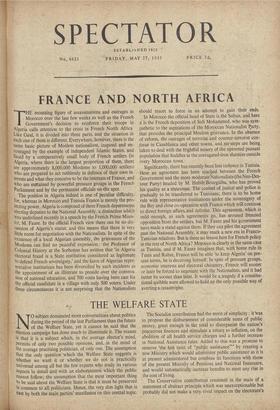FRANCE AND NORTH AFRICA T HE mounting figure of assassinations and
outrages in , Morocco over the last few weeks as well as the French Government's decision to reinforce their troops in Algeria calls attention to the crisis in French North Africa. Like Gaul, it is divided into three parts, and the situation in each one of them is different. Everywhere, however, there is the same basic picture of Moslem nationalism, inspired and en- couraged by the example of independent Islamic States, and faced by a comparatively small body of French settlers (in Algeria, where there is the largest proportion of them, there are approximately 8,090,000 Moslems to 1,000,000 settlers) who are prepared to act ruthlessly in defence of their own. in- terests and what they conceive to be the interests of France, and who are sustained by powerful pressure groups in the French Parliament and by the permanent officials on the spot.
The position in Algeria indeed is one of peculiar difficulty, for, whereas in Morocco and Tunisia France is merely the pro- tecting power, Algeria is composed of three French departments electing deputies to the National Assembly, a distinction which was underlined recently in a speech by the French Prime Minis. kr, M. Faure. In the official French view there can be no dis- cussion of Algeria's status: and this means that there is very little room for negotiation' with the Nationalists. In spite of the , existence of a local Algerian assembly, the grievances of the Moslems can find no peaceful expression : the Professor of Colonial History at the Sorbonne has' written that `in Algeria electoral fraud is a State institution considered as legitimate to defend French sovereignty,' and the farce of Algerian repre- sentative institutions has been diversified by such incidents as the appointment of an illiterate to preside over the commis• sion of national education, and 700 votes having been cast fot the official candidate in a village with only 500 voters. Under these circumstances it is not surprising that the Nationalists should resort to force in an attempt to gain their ends.
In Morocco the official head of State is the Sultan, and here it is the French deposition of Sidi Mohammed, who was sym- pathetic to the aspirations of the Moroccan Nationalist Party, that provides the principal Moslem grievance. In the absence of reform, the outrages of terrorist and counter-terrorist con- tinue in Casablanca and other towns, and no steps are being taken to deal with the frightful misery of the uprooted peasant population that huddles in the corrugated-iron Shanties outside every Moroccan town.
Significantly. there has recently been less violence in Tunisia. Here an agreement has been reached between the French Government and the more moderate Nationalists (theNeo-Des- tour Party) headed by M. Habib Bourguiba, who has proved his quality as a statesman. The control of justice and police is gradually to be transferred to Tunisians; there is to be .home rule with representative institutions under the sovereignty of the Bey and close co-operation with France which will continue to direct foreign affairs.and defence. This agreement, which is mild enough, as such agreements go, has aroused frenzied opposition from the settlers, but M. Faure and his government have made a stand against them. If they can pilot the agreement past the National Assembly, it may mark a new era in Franco- Tunisian relations. But is there no lesson here for French policy in the rest of North Africa? Morocco is clearly in the same case as Tunisia, and if M. Faure imagines that, with home rule in Tunis and Rabat, France will be able 'to keep Algeria' on pre- sent terms, he is deceiving himself. In spite of pressure groups, economic interests and electoral chicanery, France will sooner or later be forced to negotiate with the Nationalists, and it had better be sooner than later. It would be a tragedy if a constitu- tional quibble were allowed to hold up the only possible way of averting a catastrophe.


































 Previous page
Previous page